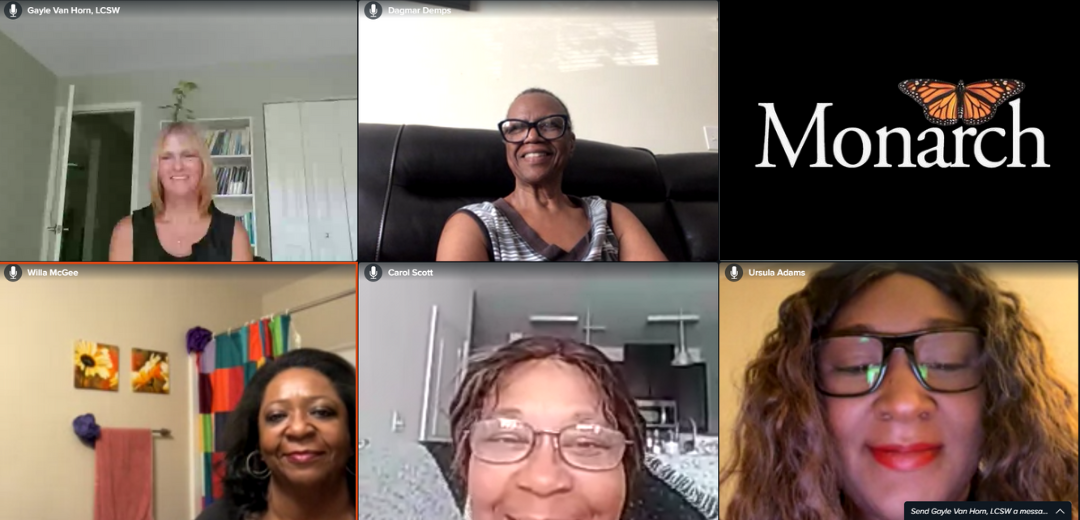“What’s Going Well”: Group Therapy Empowers Women’s Mental Health
Finding a supportive community can make all the difference in mental health. Monarch’s “What’s Going Well” women’s group, led by Behavioral Health Therapist Gayle Van Horn, offers a unique and empowering space for women to connect and share experiences. This virtual group therapy program focuses on helping women navigate life’s challenges while fostering mutual support and personal growth.
Over the past year, participants have shared how the group’s safe, encouraging environment has transformed their lives. As one member, Willa McGee, put it, “At first, I didn’t think it would work because I was hesitant telling people I didn’t know about myself, but I learned a lot from them and have come to respect their opinions – they become an extension of you.”

The Benefits of the “What’s Going Well” Women’s Group Therapy
Group therapy provides a unique opportunity to learn and grow in a collaborative setting. The “What’s Going Well” women’s group was created in response to the social isolation many experienced during COVID-19. Initially, some members were hesitant to join, unsure if they could trust others with personal details, especially “people I don’t know online,” as one member put it. However, as the group developed, these reservations gave way to trust, connection and mutual support.
Since the pandemic, virtual group therapy has become a more convenient option for many, allowing participants to connect from the comfort of their homes while still receiving valuable support. Learn more about how virtual options like the “What’s Going Well” women’s group work and view a helpful video explaining the process in our article, Group Therapy Transitions to Virtual Opportunity for Healing.
Gayle Van Horn designed the group to focus on solutions rather than just problems. “This group was built so we could work together, not only to share challenges but to find ways forward,” she explains. Participants engage in open discussions, offering feedback, advice, and support.
One member, Salina Willoughby, shared: “I truly enjoy my time in group because it allows me to open up and tell my story. I’ve received valuable feedback, new coping skills and learned from others. The support from this group is incredible.”
Why Group Therapy Works: Emotional Support and Shared Experiences
Group therapy offers numerous benefits, including emotional support, a sense of community, and the chance to learn from others’ experiences. In the “What’s Going Well” group, women share their personal journeys, helping one another to feel seen, heard and understood. As participant Willa McGee described it, “The more I heard their stories, the more I felt comfortable. People are just people, and they have problems just like I do.”

This sense of shared understanding is a core aspect of group therapy. As highlighted in our article Shoulders to Lean On: Group Therapy Offers New Perspective on Diagnosis, group therapy allows participants to learn new coping skills, gain new perspectives on their diagnosis, and support one another in meaningful ways. These sessions often provide insights that individual therapy alone may not offer, fostering a collective growth experience.
Research shows that group therapy can be as effective as individual therapy, with the added advantage of fostering connection and reducing feelings of isolation. Studies, such as those shared by the Mayo Clinic, emphasize that group therapy can reduce feelings of isolation and improve mental health outcomes by helping participants see they are not alone. Members often say that hearing others’ perspectives helps them better understand their own situations and find new ways to cope.
The Power of Community in Mental Health Support
In group therapy, the sense of community is a powerful tool for healing. The “What’s Going Well” group is a space where women can come together and support each other through life’s challenges. The shared experience of navigating mental health struggles creates a bond that members describe as invaluable.
Dagmar Demps, one of the group members, highlighted how important this sense of community has been for her: “I didn’t know anyone when I moved here, and after joining the group, I felt like I wasn’t so alone. It’s given me the confidence to keep going, even on the hardest days.”
Gayle emphasizes that the group’s success lies in the members’ willingness to be vulnerable and open: “These women have done an amazing job of trusting one another and building a community where everyone feels supported.”
Why Group Therapy is a Valuable Part of Mental Health Care
The “What’s Going Well” group showcases the broader benefits of group therapy, making it clear why participating in such groups can be a valuable part of mental health care. Group therapy offers:
- Emotional support: Sharing challenges with others creates a sense of relief and understanding.
- Shared experiences: Hearing similar stories helps reduce feelings of isolation and fosters connection.
- Constructive feedback: Participants gain valuable insights and coping strategies from one another.
- Personal growth: Members often experience improved self-confidence and better emotional regulation.
For those considering group therapy, the experience can be transformative. “Give it a try,” another member, Nevonday Simmons advised. “You might be surprised at how much you gain from it. You don’t have to share everything right away—just being there is a step in the right direction.”
If you or someone you know is interested in exploring the benefits of group therapy, or other mental health support services, visit our Behavioral Health webpage or reach out to us at (866) 272-7826.
Posted on: Thursday October 3, 2024
